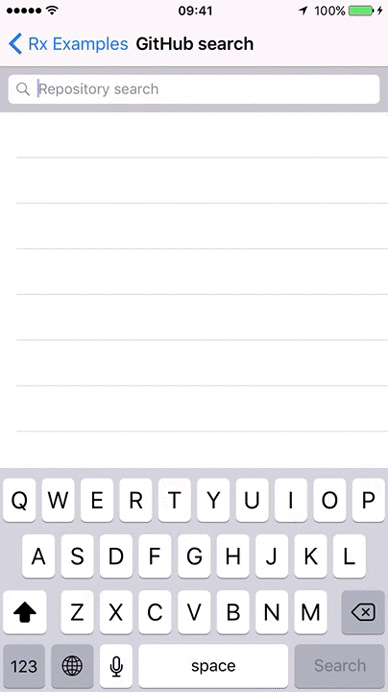Rx is a generic abstraction of computation expressed through Observable<Element> interface.
This is a Swift version of Rx.
It tries to port as many concepts from the original version as possible, but some concepts were adapted for more pleasant and performant integration with iOS/macOS environment.
Cross platform documentation can be found on ReactiveX.io.
Like the original Rx, its intention is to enable easy composition of asynchronous operations and event/data streams.
KVO observing, async operations and streams are all unified under abstraction of sequence. This is the reason why Rx is so simple, elegant and powerful.
- why use rx?
- the basics, getting started with RxSwift
- units - what is
Driver,ControlProperty, andVariable... and why do they exist? - testing
- tips and common errors
- debugging
- the math behind Rx
- what are hot and cold observable sequences?
- Integrate RxSwift/RxCocoa with my app. Installation Guide
- with the example app. Running Example App
- with operators in playgrounds. Playgrounds
- All of this is great, but it would be nice to talk with other people using RxSwift and exchange experiences.
Join Slack Channel
- Report a problem using the library. Open an Issue With Bug Template
- Request a new feature. Open an Issue With Feature Request Template
- libraries from RxSwiftCommunity.
- Pods using RxSwift.
- Does this exist for Android? RxJava
- Where is all of this going, what is the future, what about reactive architectures, how do you design entire apps this way? Cycle.js - this is javascript, but RxJS is javascript version of Rx.
- Xcode 8.0
- Swift 3.0
Rx doesn't contain any external dependencies.
These are currently the supported options:
Open Rx.xcworkspace, choose RxExample and hit run. This method will build everything and run the sample app
Tested with pod --version: 1.1.1
# Podfile
use_frameworks!
target 'YOUR_TARGET_NAME' do
pod 'RxSwift', '~> 3.0'
pod 'RxCocoa', '~> 3.0'
end
# RxTests and RxBlocking make the most sense in the context of unit/integration tests
target 'YOUR_TESTING_TARGET' do
pod 'RxBlocking', '~> 3.0'
pod 'RxTest', '~> 3.0'
endReplace YOUR_TARGET_NAME and then, in the Podfile directory, type:
$ pod installTested with carthage version: 0.18.1
Add this to Cartfile
github "ReactiveX/RxSwift" ~> 3.0
$ carthage updateTested with swift build --version: 3.0.0 (swiftpm-19)
Create a Package.swift file.
import PackageDescription
let package = Package(
name: "RxTestProject",
targets: [],
dependencies: [
.Package(url: "https://github.com/ReactiveX/RxSwift.git", majorVersion: 3)
]
)$ swift build- Add RxSwift as a submodule
$ git submodule add git@github.com:ReactiveX/RxSwift.git- Drag
Rx.xcodeprojinto Project Navigator - Go to
Project > Targets > Build Phases > Link Binary With Libraries, click+and selectRxSwift-[Platform]andRxCocoa-[Platform]targets
- http://reactivex.io/
- Reactive Extensions GitHub (GitHub)
- Erik Meijer (Wikipedia)
- Expert to Expert: Brian Beckman and Erik Meijer - Inside the .NET Reactive Framework (Rx) (video)
- Reactive Programming Overview (Jafar Husain from Netflix)
- Subject/Observer is Dual to Iterator (paper)
- Rx standard sequence operators visualized (visualization tool)
- Haskell




